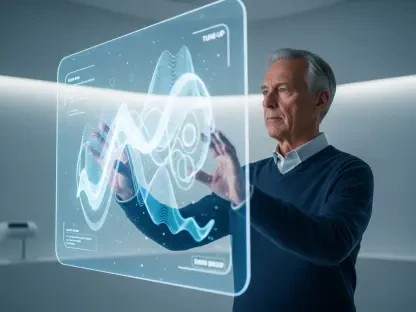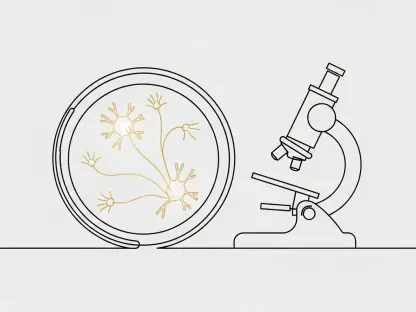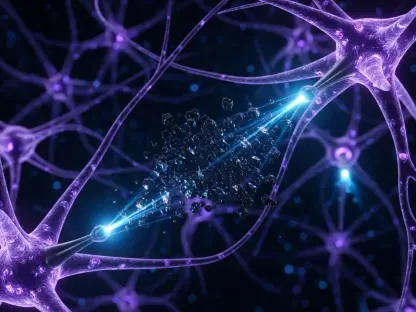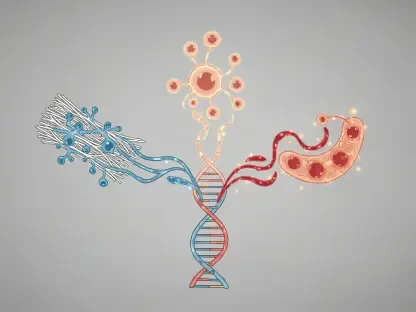In a groundbreaking development poised to reshape medical diagnostics, Professor Kenji Suzuki and his team at the Institute of Science Tokyo have unveiled a pioneering AI model that has dramatically reduced data requirements for lung cancer diagnosis. Presented at the 2024 Annual Meeting of the Radiological Society of North America (RSNA), this model promises to transform diagnostics by offering efficient, reliable results with minimal computational resources. Typically, artificial intelligence has relied heavily on data-heavy models requiring extensive datasets to provide accurate readings. However, Suzuki’s model diverges from this norm, functioning effectively with a mere fraction of the traditional data input, thereby democratizing advanced diagnostic capacities.
Innovating Beyond Conventional AI Models
Minimalistic Deep Learning Approach
Central to Suzuki’s innovation is a minimalistic deep learning model that dispenses with the need for colossal data sets and expensive GPU servers. Traditional AI systems often necessitate processing millions of images, demanding substantial computational power and infrastructure investment. This practice has long been a barrier for resource-constrained settings. In contrast, Suzuki’s model stands out by being operational on a standard laptop, requiring only 68 cases to achieve its results. This reduction is made possible through a unique technique inspired by massive-training artificial neural networks (MTANN).
The uniqueness of the model lies in its capability to learn from individual pixels in CT scan images. By focusing on finer image details rather than the sheer volume of data, this model allows for quick, accurate diagnosis without the demands of high-powered computing infrastructure. It opens the doors for advanced diagnostics in areas with limited access to extensive data repositories, highlighting the potential for diagnosing rare diseases where data scarcity has traditionally been a hurdle. The newfound accessibility also extends the reach of quality healthcare into economically disadvantaged regions.
Performance and Impact on Diagnostics
Suzuki’s AI system not only maintains minimal data requirements but also leads in performance compared to cutting-edge models. Its efficacy in differentiation is demonstrated by its ability to achieve an Area Under the Curve (AUC) value of 0.92. This surpasses other advanced systems like the Vision Transformer and 3D ResNet, which recorded AUC scores of 0.53 and 0.59. The outstanding performance marks a significant leap in the accuracy of lung cancer diagnostics, suggesting a new standard in medical imaging analysis.
The implications of this technological advancement extend beyond just improved diagnosis. By reducing the resources required for operation, the model stands to decrease the environmental impact of AI in healthcare. As demands on data centers grow, creating eco-friendly, energy-efficient AI becomes crucial. Suzuki’s model emerges as a solution to this, potentially mitigating issues related to energy consumption and offering a pathway to more sustainable AI practices.
Swift and Resource-Efficient Training
Speed and Precision in AI Training
The time efficiency achieved in training processes is a standout feature of Suzuki’s model. On a conventional laptop, the entire training phase lasts only 8 minutes and 20 seconds, a testament to its streamlined methodology. This efficiency revolutionizes the deployment of AI models, making them rapidly adaptable to clinical settings around the world. Medical professionals can now access sophisticated diagnostic tools without the previously prohibitive waiting times or computing resources, accelerating the integration of AI in routine healthcare.
A key advantage of such rapid processing is the model’s diagnostic prediction speed, clocking in at just 47 milliseconds per case. This rapid response rate enhances the ability of healthcare providers to offer timely diagnoses and initiate treatment plans without delay. The speed at which AI can now assist in urgent medical decisions holds profound implications for patient outcomes, particularly in time-sensitive conditions like cancer where early detection is paramount.
Broader Implications for Healthcare
The technology not only secures faster diagnostics but also symbolizes a shift in healthcare paradigms—minimizing wait times and conserving medical personnel resources. This capability supports a more dynamic, responsive healthcare environment. Importantly, the model’s efficiency ensures diagnoses in less urbanized areas where healthcare resources may be sparse, bridging gaps in medical infrastructure.
The recognition of Suzuki’s work, underscored by the prestigious Cum Laude Award at RSNA 2024, reflects the broader acceptance and excitement surrounding this innovation. By pushing the boundaries of AI and medicine, Suzuki has effectively set a benchmark for future research in the biomedical field. His accomplishments further emphasize the necessity of interdisciplinary collaborations in evolving healthcare practices to meet modern demands.
Pioneering Future Healthcare Solutions
Suzuki’s Vision and Impact on AI
Professor Kenji Suzuki’s longstanding dedication to advancing AI in medicine underscores his influential role in this field. With over 25 years of experience, his contributions encompass 400 published works and 40 patents. These are primarily commercialized, further evidencing his impact. Suzuki’s role in AI spearheading reflects his foresight in blending engineering with medical practices to develop solutions not only efficient but globally applicable.
Suzuki’s notable roles, including chairing sessions at the AAAI Conference and receiving top honors from RSNA, attest to his leadership and pioneering spirit. His vision is to foster innovation that bridges AI and medicine, viewing interdisciplinary collaboration as key to groundbreaking advancements. His perspective offers a template for future technological pursuits aiming to enhance human well-being while ensuring sustainability.
The Path Forward for AI in Diagnostics
In a revolutionary stride poised to redefine medical diagnostics, Professor Kenji Suzuki and his team at the Institute of Science Tokyo have launched an innovative AI model that significantly reduces the data needed for lung cancer detection. This breakthrough was showcased at the 2024 Annual Meeting of the Radiological Society of North America (RSNA) and is set to transform diagnostics by delivering efficient, reliable results while consuming minimal computational resources. Traditionally, AI has depended on data-intensive models that require vast datasets to deliver accurate diagnoses. In contrast, Suzuki’s model marks a departure from this conventional approach by performing effectively with just a fraction of the data typically required. This not only enhances efficiency but also makes advanced diagnostic tools more accessible and equitable. By cutting down on data dependency, the model democratizes diagnostic capabilities, potentially extending cutting-edge medical technology to clinics and regions with limited resources or access to comprehensive datasets.









